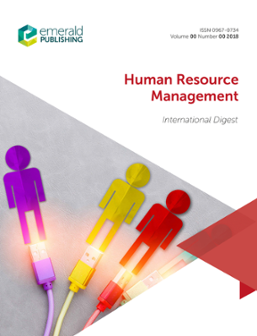Table of contents
Authoritarian leadership: Curvilinear relationships with organizational citizenship and organizational deviance
The purpose of this study is to examine the relationships between authoritarian leadership and OCBS and authoritarian leadership and organizational deviance.
The pervasive power of bespoke internal branding: Assessing the impact of employees’ generational differences and organizational tenure
This paper aims to review the latest management developments across the globe and pinpoint practical implications from cutting-edge research and case studies.
Understanding the currency of trust in virtual teams: Dynamic trust experience strategies for achieving high performance
This paper aims to review the latest management developments across the globe and pinpoint practical implications from cutting-edge research and case studies.
Canadian researchers advise law firms to ensure employees feel empowered to negotiate work-life balance (WLB)
The purpose was to find out how lawyers at high-profile legal firms managed WLB.
The social pillar of lean: a theoretical framework
The purpose of this paper is to propose a theoretical framework for the social pillar of lean which can be used to direct future research into lean thinking.
The impact of digital competencies on job candidate suitability: A model for assessing graduates seeking economist and business manager roles
This paper aims to review the latest management developments across the globe and pinpoint practical implications from cutting-edge research and case studies.
Organizational effectiveness: a unified model
The purpose of this study is to present a unified model of organizational effectiveness bringing together the disparate elements put forward by previous researchers to provide a…
Boosting the leadership capacity of supervisors in low-skilled occupations: Lessons from New Zealand in designing an autonomy-supportive training programme
This paper aims to review the latest management developments across the globe and pinpoint practical implications from cutting-edge research and case studies.
Swedish researcher proposes degendered organizational resilience model that combines masculine “oak” qualities with feminine “willow” qualities
Witmer's belief in the benefits of degendering resiliency is based on three assumptions. First, that gender is socially constructed. Second, that what is historically, socially…
UAE study of student-mothers highlights importance of mentoring and time management for successful internships
The purpose was to find out the experiences of student mothers on internships and assess how best to make the process go as well as possible.
Chinese study shows inverted U-shaped relationship between knowledge leadership and knowledge hiding
The authors wanted to study the antecedents of knowledge hiding from a leadership perspective.
Supportive management culture helps the informal learning of young auditors
The purpose was to test how best to bring about informal learning in the auditing profession
Delivering on organizational promises: the role of employer branding in employee retention
This paper aims to review the latest management developments across the globe and pinpoint practical implications from cutting-edge research and case studies.
Study of Québec healthworkers shows a positive psychosocial safety climate (PSC) reduces reliance on “workarounds”
The purpose was to work out whether by creating a positive working environment reduced turnarounds by reducing the risk of physical fatigue, cognitive weariness and emotional…
Research shows authentic leadership has positive effect on performance and commitment in Iranian tourist sector
The goal was to try to find out if workers in Iranian tourist agencies benefited from the authentic leadership (AL) of their bosses

ISSN:
0967-0734Online date, start – end:
2002Copyright Holder:
Emerald Publishing LimitedOpen Access:
hybridMerged from:
Management Development ReviewEditor:
- Nicholas King